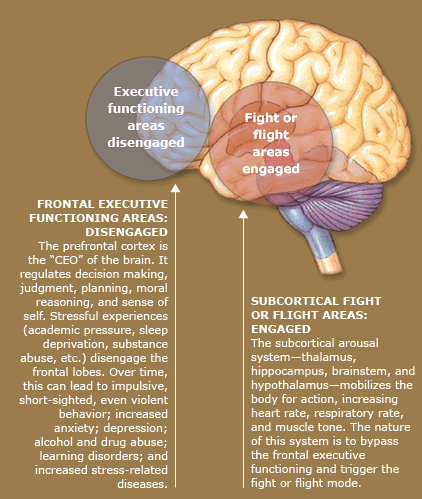What Does Stress Affect the Brain?

The ventricles of your brain are an integral communication system of chambers filled with CSF and located in the cerebrum. Gross Anatomy and Physiology describe the functions and structures of these structures. It is also used as the basis for developmental, reproductive and physiological disorders. The nervous system, being a complex biological system, is made up of many interconnected components.
The three main systems of the nervous system include the central nervous system, the peripheral nervous system, and the spinal cord. The brain is the central component of all three systems. Various functions of the nervous system are performed in the brain, including regulating blood pressure, muscle contraction, digestion and excretion, and vision. The brain is made up of several smaller parts, including the cerebellum, thalamus, and basal ganglia.
When you receive information or experience, your brain sends information to your neurons in the brain. This is done in such a way that the brain can change and adapt to new circumstances. The information sent to the neurons puts your brain into "learning mode."
When you learn something, neurons in your brain send electrical signals to other neurons in your brain. These signals then trigger neurons in your brain to fire, allowing you to remember or gain knowledge.
When you are awake, most of your cerebral cortex is devoted to memory and conscious thinking. When you are in a relaxed state, the part of the cerebral cortex responsible for conscious thinking is relatively larger. When you are in a stressful situation, your conscious cortex tends to contract, so you have less conscious control over your behavior. Because of this, stress affects your ability to focus on tasks and solve problems.
Stress can also affect your brain function, weakening your immune system, leading to illness. As you can imagine, this can have a direct impact on your cognitive function and interfere with academic performance
Damage to the ventricle in your brain can be the result of a variety of causes including traumatic brain injury, head trauma, stroke or brain tumors. Sometimes, the ventricle is affected by a stroke due to an abnormal blood clot blocking the arteries supplying the ventricular cavity.
The most important function of the ventricle is to keep blood circulating between the heart and the body. When this circulation is interrupted, your body does not receive enough blood to the different tissues of the body. These tissues are then starved of oxygen and nutrients, causing them to die.
When your brain is functioning at normal activities, it receives all of the oxygen and nutrients needed for normal cellular activity. The problem begins when the brain has trouble accessing oxygen and nutrients because of oxygen and nutrients that have been consumed. The cells in the ventricular cavity, which supply blood to the brain, become starved of oxygen and nutrients. The brain cells begin to die, leaving the neurons in the brain without oxygen and nutrients, causing the neurons to die.
In the case of brain death, a person may experience a seizure, coma or death. When the blood flow in the ventricle becomes blocked, you will not be able to hear, see, speak or swallow, and feel anything but the simplest sensations. Your body will remain lifeless.
If you think that you are experiencing symptoms of brain death, your doctor should do a test known as an EEG scan to determine the status of the brain. If the test reveals the presence of no abnormalities or if you suffer from any other symptoms, you may be in mild to moderate brain death.
When brain death occurs, you may experience problems with breathing or seizures or may not be able to produce bowel movements. While unconscious, your brain does not respond to stimuli and cannot regulate blood pressure and body temperature.
Your body may not respond to pain or sensation. If this is the case, you may be unable to think clearly. Once you pass away, your brain remains in a dormant state, allowing the neurons in the brain to die and decompose, causing them to decay and eventually fall into the body.